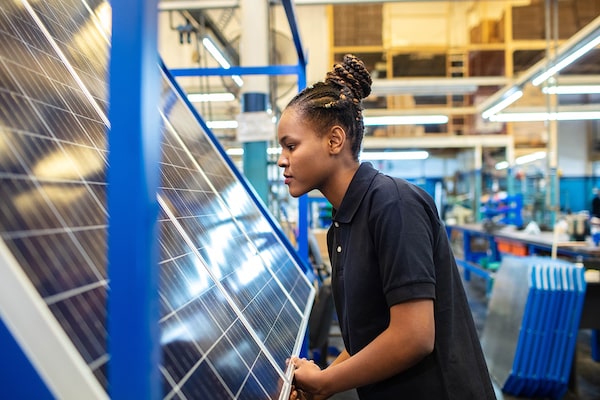
iStockPhoto / Getty Images
Canada is a global leader in clean technology and innovation powered by its growing expertise in sectors such as agriculture, power generation and green buildings.
The country ranked second on the 2021 Global Cleantech Innovation Index and has ever-expanding opportunities alongside the global energy transition and as the world economy moves towards a low-carbon future.
Cleantech has been a key focus for Export Development Canada (EDC), which has supported over $20-billion in exports in the rapidly expanding sector over the past decade. There is increased awareness among Canadians that the country can and should be doing more to address the impacts of climate change, says Lynn Côté, EDC’s national lead for cleantech ecosystems and market intelligence.
“Compared to when we got started in cleantech in 2012, there’s greater recognition today that the world is facing a climate crisis and that greater adoption of clean technologies is critical to reducing emissions and achieving a low-carbon and more sustainable future.”
Soaring fuel prices, given increased demand, and more recently the war in Ukraine, have renewed consumer interest in hybrid and electric vehicles, Ms. Côté says.
Still, she adds, transportation represents only a small fraction of Canada’s $70.5-billion environmental and cleantech products sector, accounting for about 3 per cent of GDP, according to Statistics Canada data.
The federal government has committed to reaching net-zero emissions for the economy by 2050, with interim reduction targets for the most carbon-intensive sectors for 2023 and 2030. Given the importance of cleantech to help Canada meet its net-zero target, EDC has aligned itself with the emissions reduction priorities of the federal government and intends to grow its support of the cleantech sector.
Pressure for solutions that are better for the environment is not just coming from the government, Ms. Côté says. Investors, including large institutional shareholders, are pressuring companies to change. It’s about reducing risk and improving the bottom line.
“There is a return on investment for companies making these changes, and they can point to the positive things they’re doing,” Ms. Côté says.
For EDC-supported companies, the top five cleantech sectors by customers served in 2021 were: power generation; extractive and industrial materials; recycling and recovery; transportation and sustainable mobility; and energy efficiency and green buildings.
Work with EDC customers is spread fairly evenly among these sectors, but the massive size of some renewable power generation projects skews the financial figures.

iStockPhoto / Getty Images
“The renewable power generation sector continues to grow at an accelerated pace,” Ms. Côté says. “Transportation is very hot, energy efficiency is becoming more important, and recycling and recovery are becoming a bigger category.”
The majority of the cleantech business exports supported by EDC are going to the giant U.S. market, Ms. Côté says. However, an increasing number of sales are ending up in the European Union or countries such as India and Colombia.
EDC works with more than 300 companies in the cleantech space, ranging from micro-sized businesses in niche areas to massive companies in sectors such as power generation. It served 324 cleantech companies in 2021 and facilitated $6.3-billion in business – a 39 per cent year-over-year increase from 2020. For context, compare this to 2015, when EDC served 86 cleantech customers and facilitated $917-million in business.
The environmental and cleantech sector employs an estimated 340,874 Canadians as of 2019, according to StatsCan, with the utilities and engineering construction segments accounting for the largest share of green workers, at 23 per cent each.
To support cleantech companies in securing export sales, EDC offers a number of solutions, of which the following are the most used:
- the EDC Export Guarantee Program, which increases a company’s cash flow by providing added funds through their financial institution to use toward operating costs, equipment purchases and international expansion;
- the EDC Account Performance Security Guarantee, which frees up capital by providing guarantees with lenders, providing guarantees for suppliers to gain more flexible terms, and to cover bonds at a predictable pre-set rate, and;
- Structured and Project Finance for major initiatives, which provides specialized advice and knowledge and limited recourse financing for long-term, capital intensive international projects.
Given its history of success in supporting cleantech export growth, EDC is positioned as a key player of the federal government’s cleantech ecosystem, providing its solutions along with Sustainable Development Technology Canada and the Business Development Bank of Canada. It also works closely with trade, sector and technology partners such as the Trade Commissioner Service, Natural Resources Canada, Innovation, Science and Economic Development Canada, and the Clean Growth Hub.
“Cleantech is the industry of the future,” Ms. Côté says. “When we started this at EDC, it was very modest, but over time we forged exceptional partnerships with government and industry organizations. In addition, the types and variety of companies that we are working with today are much more mature and diverse.”
Advertising feature produced by Globe Content Studio with EDC. The Globe’s editorial department was not involved.